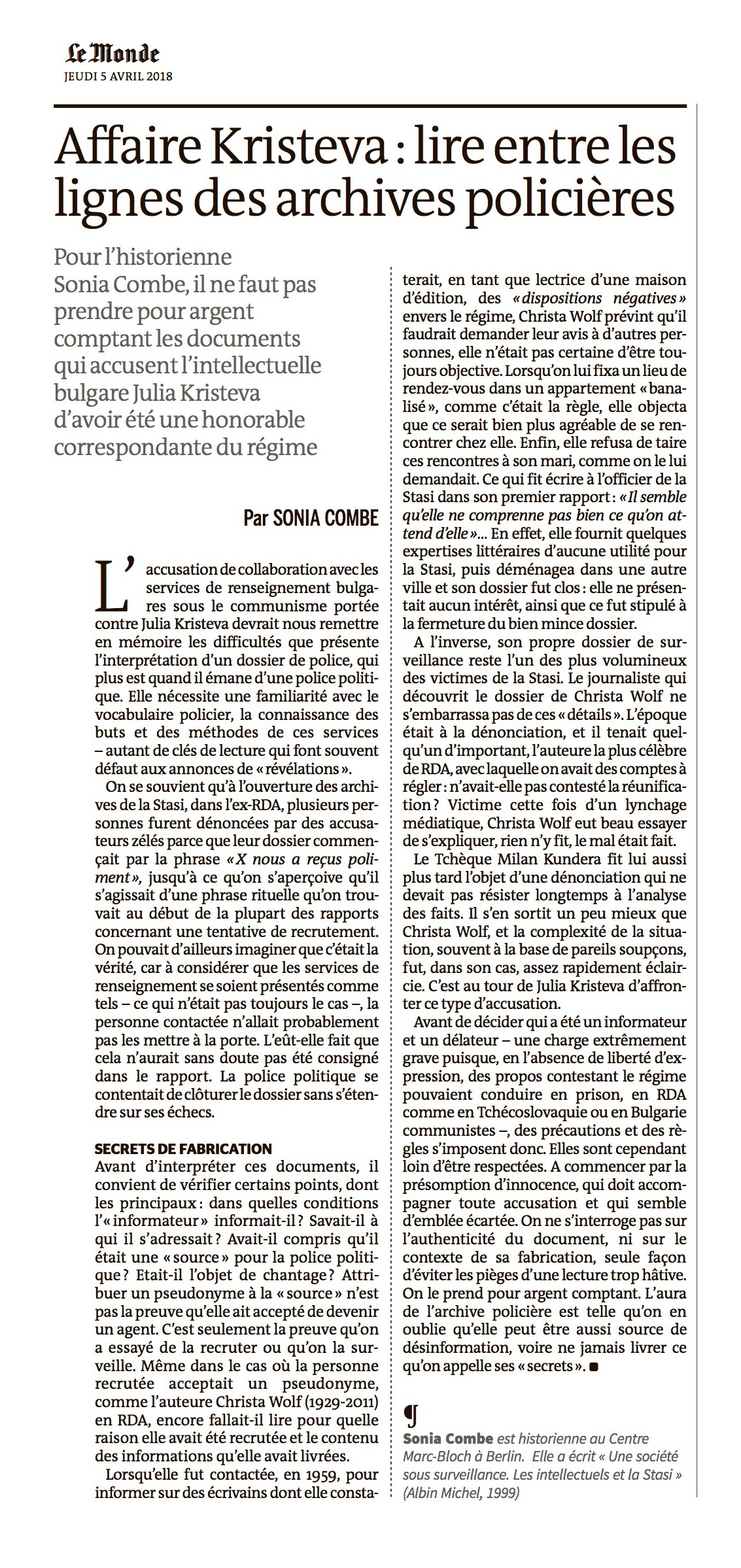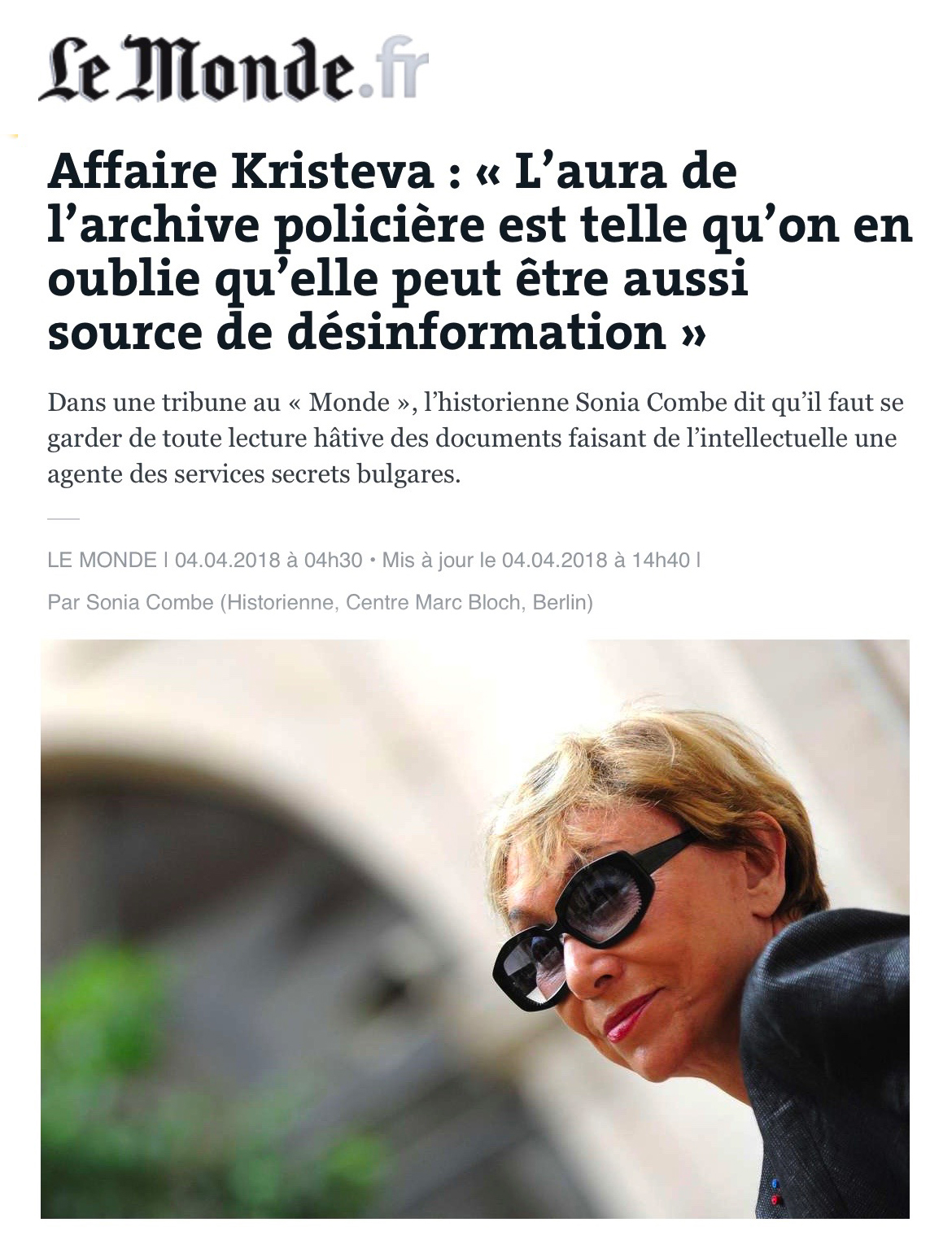The Kristeva Case: Reading Between the Lines of the Police Archives
For historian
Sonia Combe, one should not take at face value the documents accusing the
Bulgarian intellectual Julia Kristeva of having been an honorable correspondent
of the regime.
By Sonia Combe
Translated by Patsy Baudoin
The accusation that Julia
Kristeva collaborated with communist Bulgarian intelligence services ought to
remind us of the difficulties of interpreting a police file, all the more when
it comes from a political police. It requires being familiar with police
vocabulary, having knowledge of the purposes and methods of these services - so
many keys to reading that are often lacking when "revelations" are
announced. It will be remembered that when the Stasi archives were opened in
the former GDR, several people were denounced by zealous accusers because their
file started with the sentence "X received us politely", until it is
noticed that this was a ritual sentence found at the beginning of most reports
of attempted recruitment. One could well imagine that this was the truth,
because assuming that the intelligence services introduced themselves this way
- which was not always the case - the person they were contacting was probably
not going to show them the door. Had anyone done that, it probably would not
have been recorded in the report. The political police was satisfied with
closing the file without dwelling on its failures.
Manufacturing Secrets
Before interpreting these documents, certain points need to be considered, among
which the main ones are: Under what conditions did the "informant"
inform? Did he know whom he was talking to? Did he understand that he was a
source for the political police? Is he blackmailed? Assigning a pseudonym to
the "source" is not proof that he has accepted to become an agent. It
is only proof that an attempt was made to recruit or put him under surveillance.
Even if the recruited person accepted using a pseudonym, like the GDR author
Christa Wolf (1929-2011) did, one still had to read about why she was recruited
and about the content of the information she had provided.
When
she was contacted in 1959 to inform on writers about whom she, Christa Wolf,
working for a publisher, might detect a "negative disposition" toward
the regime, she warned them that they would have to seek the
advice of others since she was not sure she was always objective. When she was to
meet in an "unmarked" apartment, as was the rule, she objected that
it would be much more pleasant to meet at her home. Finally, she refused to not
tell her husband about these meetings, as she had been asked to do. Which caused
the Stasi officer to write in his first report: "It seems that she does
not understand what is expected of her ..." Indeed,
she provided some literary expertise of no use to the Stasi, then moved to
another city and her file was closed: she was of no interest, as was stipulated
at the closing of this pretty meager file.
On
the other hand, her own surveillance file remains one
of the largest of Stasi victims’. The journalist who discovered the Christa
Wolf file did not bother with such "details." It was a time of
denunciation, and he held someone important, the most famous author in the GDR,
with whom they had a score to settle: had she not
opposed the reunification? Victim this time of a media lynching, Christa Wolf
eagerly tried to explain, nothing worked, the damage
was done.
The
Czech, Milan Kundera, also later faced denunciation, but
it would not long resist an analysis of the facts. He emerged a little better off
than Christa Wolf did, and the complexity of the situation, often the basis of
such suspicions, was, in his case, quite quickly cleared up. Now it's Julia
Kristeva's turn to face this type of accusation.
Before
deciding who was an informant and an informer - an extremely serious charge
since, in the absence of freedom of speech, statements contesting the regime
could lead to prison in the GDR as in Czechoslovakia or in Communist Bulgaria -
precautions and rules are needed. They are, however, far from being respected,
beginning with the presumption of innocence, which must accompany any
accusation, and which seems to have been put aside. Nobody asks about the
authenticity of the document or about the context of its fabrication, which are
the only ways to avoid the trap of a hasty interpretation. It is taken at face
value. The aura of the police archive is such that we forget that it can also
be a source of misinformation, or even never deliver what are called its
"secrets."
Le Monde, 05.04.2018, p.23



